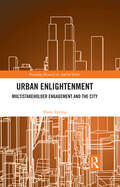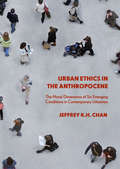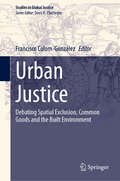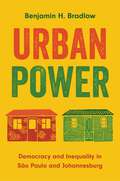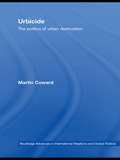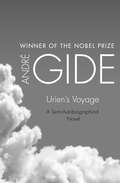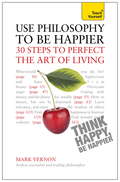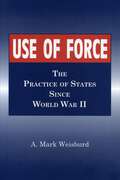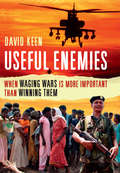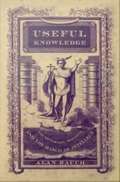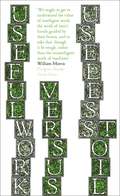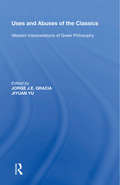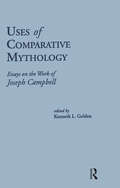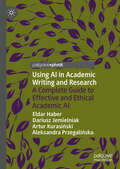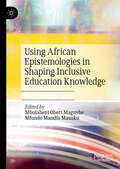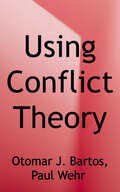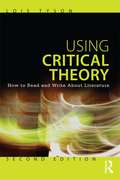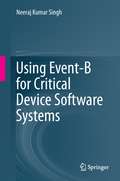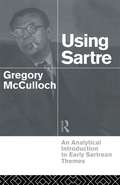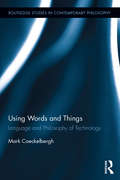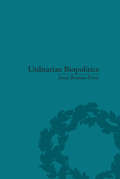- Table View
- List View
Urban Enlightenment: Multistakeholder Engagement and the City (Routledge Research in Applied Ethics)
by Shane EptingThis book applies the concept of moral ordering to urban affairs. It demonstrates how multi-stakeholder engagement can enhance the quality of city life while supporting ambitions such as ethical urban sustainability and human flourishing. While there is a history of philosophers viewing cities as technologies, cities’ encompassing nature inherently limits them. Urban sustainability matters often affect marginalized and vulnerable people, the public, nonhuman species, future generations, and urban artifacts. Problems can arise when stakeholders’ interests and needs appear at odds. The author argues in favor of the concept of moral ordering, a process designed to address issues involving different stakeholder groups such as municipal officials and residents. By employing moral ordering, a view comes into focus, revealing that the attention that each group receives reflects their place in the process, providing the necessary degree of moral respect. Finally, the author shows how moral ordering can lead to urban enlightenment. He examines real-world applications of moral ordering, such as New York City’s Participatory Budgeting Project, to make the case that municipalities can begin to bolster municipal-community relations in ways that promote urban enlightenment. Urban Enlightenment will appeal to researchers and advanced students working in philosophy of the city, applied ethics, philosophy of technology, urban planning, environmental studies, and political science.
Urban Ethics in the Anthropocene: The Moral Dimensions of Six Emerging Conditions in Contemporary Urbanism
by Jeffrey K.H. ChanIncreasingly, we live in an environment of our own making: a ‘world as design’ over the natural world. For more than half of the global population, this environment is also thoroughly urban. But what does a global urban condition mean for the human condition? How does the design of the city and the urban process, in response to the issues and challenges of the Anthropocene, produce new ethical categories, shape new moral identities and relations, and bring about consequences that are also morally significant? In other words, how does the urban shape the ethical—and in what ways? Conversely, how can ethics reveal relations and realities of the urban that often go unnoticed? This book marks the first systematic study of the city through the ethical perspective in the context of the Anthropocene. Six emergent urban conditions are examined, namely, precarity, propinquity, conflict, serendipity, fear and the urban commons.
Urban Justice: Debating Spatial Exclusion, Common Goods and the Built Environment (Studies in Global Justice #23)
by Francisco Colom-GonzálezThis book outlines an interdisciplinary normative framework that makes sense of the historical transformation of cities and helps to assess contemporary urban conditions and policies for the built environment. This normative framework is embedded in what the editor and authors have termed 'urban justice'. As is widely acknowledged, the urban condition has become the inescapable horizon of modern life. Urban relations now permeate the lives of the majority of the world's population. Even if urbanization as a global process seems to have reached its zenith, there is no end in sight to the growth of cities. This is a fact that political theory must come to terms with when debating justice. To address this, this book is divided into three sections, each dealing with the spatial dimension of social agency, normative ideas about inclusive urban design, and contemporary processes that threaten to erode the urban fabric. In doing so, it helps one to normatively evaluate the spatial materialization of social relations in the city, so the view of urban habitat as a shared good becomes prominent. This book is of interest to scholars of urban studies, social sciences, political theory, and social philosophy, as well as those interested in contemporary urban processes in general.
Urban Poverty and Party Populism in African Democracies
by Danielle ResnickWhen and why do the urban poor vote for opposition parties in Africa's electoral democracies? The strategies used by political parties to incorporate the urban poor into the political arena provide a key answer to this question. This book explores and defines the role of populism in Africa's urban centers and its political outcomes. In particular, it examines how a populist strategy offers greater differentiation from the multitude of African parties that are defined solely by their leader's personality, and greater policy congruence with those issues most relevant to the lives of the urban poor. These arguments are elaborated through a comparative analysis of Senegal and Zambia based on surveys with informal sector workers and interviews with slum dwellers and politicians. The book contributes significantly to scholarship on opposition parties and elections in Africa, party linkages, populism, and democratic consolidation.
Urban Power: Democracy and Inequality in São Paulo and Johannesburg (Princeton Studies in Global and Comparative Sociology)
by Benjamin H. BradlowWhy some cities are more effective than others at reducing inequalities in the built environmentFor the first time in history, most people live in cities. One in seven are living in slums, the most excluded parts of cities, in which the basics of urban life—including adequate housing, accessible sanitation, and reliable transportation—are largely unavailable. Why are some cities more successful than others in reducing inequalities in the built environment? In Urban Power, Benjamin Bradlow explores this question, examining the effectiveness of urban governance in two &“megacities&” in young democracies: São Paulo, Brazil, and Johannesburg, South Africa. Both cities came out of periods of authoritarian rule with similarly high inequalities and similar policy priorities to lower them. And yet São Paulo has been far more successful than Johannesburg in improving access to basic urban goods.Bradlow examines the relationships between local government bureaucracies and urban social movements that have shaped these outcomes. Drawing on sixteen months of fieldwork in both cities, including interviews with informants from government agencies, political leadership, social movements, private developers, bus companies, and water and sanitation companies, Bradlow details the political and professional conflicts between and within movements, governments, private corporations, and political parties. He proposes a bold theoretical approach for a new global urban sociology that focuses on variations in the coordination of local governing power, arguing that the concepts of &“embeddedness&” and &“cohesion&” explain processes of change that bridge external social mobilization and the internal coordinating capacity of local government to implement policy changes.
Urbicide: The Politics of Urban Destruction (Routledge Advances in International Relations and Global Politics #66)
by Martin CowardThe term ‘urbicide’ became popular during the 1992-95 Bosnian war as a way of referring to widespread and deliberate destruction of the urban environment. Coined by writers on urban development in America, urbicide captures the sense that the widespread and deliberate destruction of buildings is a distinct form of violence. Using Martin Heidegger’s notion of space and Jean-Luc Nancy’s idea of community, Martin Coward outlines a theoretical understanding of the urban condition at stake in such violence. He contends that buildings are targeted because they make possible a plural public space that is contrary to the political aims of ethnic-nationalist regimes. Illustrated with reference to several post-Cold War conflicts – including Bosnia, Chechnya and Israel/Palestine – this book is the first comprehensive analysis of organised violence against urban environments. It offers an original perspective to those seeking to better understand urbanity, political violence and the politics of exclusion.
Urien's Voyage
by André GideNobel Prize–winning writer André Gide marks his voyage toward self-discovery in this imaginative allegorical work When Urien and his sailing companions begin their voyage, it is to places unknown and, perhaps, only dreamed. This allegorical masterpiece from André Gide, a key figure of French letters, deftly illustrates the techniques and doctrine of the Symbolist movement—and the dual nature of Gide&’s own psyche. Written at a crucial time in his artistic development, this imaginative work signals his gradual abandonment of acetic celibacy toward an embrace of pleasure and carnal desires, revealing a Gide more transparent in this early work than in his mature writings. Translator and scholar Wade Baskin annotates the work, connecting Gide&’s life and bibliography to the text.
Urien's Voyage
by André GideNobel Prize–winning writer André Gide marks his voyage toward self-discovery in this imaginative allegorical work When Urien and his sailing companions begin their voyage, it is to places unknown and, perhaps, only dreamed. This allegorical masterpiece from André Gide, a key figure of French letters, deftly illustrates the techniques and doctrine of the Symbolist movement—and the dual nature of Gide&’s own psyche. Written at a crucial time in his artistic development, this imaginative work signals his gradual abandonment of acetic celibacy toward an embrace of pleasure and carnal desires, revealing a Gide more transparent in this early work than in his mature writings. Translator and scholar Wade Baskin annotates the work, connecting Gide&’s life and bibliography to the text.
Use Philosophy to be Happier: 30 Steps to Perfect the Art of Living
by Mark VernonHappiness. We all want it - but how can we get it? Author Mark Vernon has solved the problem by collecting the wisdom of the greatest minds in history and making their thinking on the important things in life accessible and, above all, practical. Full of everyday examples to make sometimes high-blown philosophy entertaining and relevant, this book shows you how you can crack the secret to living The Good Life.
Use Philosophy to be Happier: 30 Steps to Perfect the Art of Living
by Mark VernonHappiness. We all want it - but how can we get it? Author Mark Vernon has solved the problem by collecting the wisdom of the greatest minds in history and making their thinking on the important things in life accessible and, above all, practical. Full of everyday examples to make sometimes high-blown philosophy entertaining and relevant, this book shows you how you can crack the secret to living The Good Life.
Use of Force: The Practice of States Since World War II
by Arthur Mark WeisburdThis book is among the few to develop in detail the proposition that international law on the subject of interstate force is better derived from practice than from treaties. Mark Weisburd assembles here a broad body of evidence to support practice-based rules of law on the subject of force. Analyses of a particular use of force by a state against another state generally begin with the language of the Charter of the United Nations. This approach is seriously flawed, argues Weisburd. States do not, in fact, behave as the Charter requires. If the legal rule regulating the use of force is the rule of the Charter, then law is nearly irrelevant to the interstate use of force. However, treaties like the Charter are not the only source of public international law. Customary law, too, is binding on states. If state behavior can be shown to conform generally to what amount to tacit rules on the use of force, and if states generally enforce such rules against other states, then the resulting pattern of practice strongly supports the argument that the use of force is affected by law at a very practical level. This work aims to demonstrate that such patterns exist and to explain their content. Weisburd discusses over one hundred interstate conflicts that took place from 1945 through 1991. He focuses on the behavior of the states using force and on the reaction of third parties to the use of force. He concentrates upon state practice rather than upon treaty law and does not assume a priori that any particular policy goal can be attributed to the international legal system, proceeding instead on the assumption that the system's goals can be determined only by examining the workings of the system.
Useful Enemies
by David KeenThere are currently between twenty and thirty civil wars worldwide, while at a global level the Cold War has been succeeded by a "war on drugs" and a "war on terror" that continues to rage a decade after 9/11. Why is this, when we know how destructive war is in both human and economic terms? Why do the efforts of aid organizations and international diplomats founder so often? In this important book David Keen investigates why conflicts are so prevalent and so intractable, even when one side has much greater military resources. Could it be that endemic disorder and a "state of emergency" are more useful than bringing conflict to a close? Keen asks who benefits from wars--whether economically, politically, or psychologically—and argues that in order to bring them successfully to an end we need to understand the complex vested interests on all sides.
Useful Knowledge: The Victorians, Morality, and The March of Intellect
by Alan RauchNineteenth-century England witnessed an unprecedented increase in the number of publications and institutions devoted to the creation and the dissemination of knowledge: encyclopedias, scientific periodicals, instruction manuals, scientific societies, children's literature, mechanics' institutes, museums of natural history, and lending libraries. In Useful Knowledge Alan Rauch presents a social, cultural, and literary history of this new knowledge industry and traces its relationships within nineteenth-century literature, ending with its eventual confrontation with Charles Darwin's Origin of Species. Rauch discusses both the influence and the ideology of knowledge in terms of how it affected nineteenth-century anxieties about moral responsibility and religious beliefs. Drawing on a wide array of literary, scientific, and popular works of the period, the book focusses on the growing importance of scientific knowledge and its impact on Victorian culture. From discussions of Jane Webb Loudon's The Mummy! and Mary Shelley's Frankenstein, to Charlotte Bront's The Professor, Charles Kingsley's Alton Locke, and George Eliot's Mill on the Floss, Rauch paints a fascinating picture of nineteenth-century culture and addresses issues related to the proliferation of knowledge and the moral issues of this time period. Useful Knowledge touches on social and cultural anxieties that offer both historical and contemporary insights on our ongoing preoccupation with knowledge. Useful Knowledge will appeal to readers interested in nineteenth century history, literature, culture, the mediation of knowledge, and the history of science.
Useful Work v. Useless Toil (Penguin Great Ideas)
by William MorrisVisionary English Socialist and pioneer of the Arts and Crafts movement, William Morris argued that all work should be a source of pride and satisfaction, and that everyone should be entitled to beautiful surroundings – no matter what their class. Throughout history, some books have changed the world. They have transformed the way we see ourselves – and each other. They have inspired debate, dissent, war and revolution. They have enlightened, outraged, provoked and comforted. They have enriched lives – and destroyed them. Now Penguin brings you the works of the great thinkers, pioneers, radicals and visionaries whose ideas shook civilization and helped make us who we are.
Uses and Abuses of the Classics: Western Interpretations of Greek Philosophy
by Jiyuan YuFrom very early on, Western philosophers have been obsessed with the understanding of a relatively few works of philosophy which have played a disproportionately large and fundamental role in developing the Western philosophical canon, dominating the curriculum in the past and in the present; there is no indication that they will not do so in the future. Uses and Abuses of the Classics examines the various ways in which the different periods of the history of philosophy have approached these texts. The editors have chosen for analysis some of the major philosophers from periods of the history of philosophy in which the interpretation of the classics has been particularly significant. Contributions to this book include entries on: Aristotle's reading of Plato; Averroes on Aristotle; Nietzsche on the Beginnings of Western Philosophy; and Thomas Aquinas's Commentary on Aristotle's Metaphysics.
Uses of Comparative Mythology: Essays on the Work of Joseph Campbell (Routledge Library Editions: Myth Ser. #3)
by Kenneth L. GoldenThis collection, first published in 1992, offers critical-interpretive essays on various aspects of the work of Joseph Campbell (1904-1987), one of a very few international experts on myth. Joseph Campbell examines myths and mythologies from a comparative point of view, and he stresses those similarities among myths the world over as they suggest an existing, transcendent unity of all humankind. His interpretations foster an openness, even a generous appreciation of, all myths; and he attempts to generate a broad, sympathetic understanding of the role of these 'stories' in human history, in our present-day lives, and in the possibilities of our future.
Using AI in Academic Writing and Research: A Complete Guide to Effective and Ethical Academic AI
by Dariusz Jemielniak Eldar Haber Aleksandra Przegalińska Artur KurasińskiThis book comprehensively explores how AI tools can revolutionize academic writing, research, grant proposals, and educational practices. With a focus on practical applications, ethical considerations, and future trends, the book serves as an indispensable roadmap for academics, researchers, and educators eager to integrate AI into their work. Whether you're looking to enhance your research capabilities, craft compelling grant proposals, personalize learning experiences, or lead your institution into the future, this book provides the insights and tools necessary to navigate and shape the AI-enhanced landscape of academia. It demonstrates how to redefine scholarly work with cutting-edge AI innovations through real-life, practical examples, yet keeping the level of generalization high enough to keep it relevant for a few years. By balancing specific, actionable insights with broader perspectives, this book equips readers to not only adapt to but actively influence the evolving role of AI in higher education, research, and funding acquisition, ensuring its value as a resource both now and in the coming years.
Using African Epistemologies in Shaping Inclusive Education Knowledge
by Mbulaheni Obert Maguvhe Mfundo Mandla MasukuThis book thus explores the role of African epistemologies in addressing the myriad challenges posed by the inclusive education system in Africa and other contexts. In recent years, the shift from special education to inclusive education has had a significant impact on the provision of education and the education system as a whole in Africa. The impact has been felt in all institutions of learning from low to high, public and private, government, and across departments of education. Inclusive education, if shaped correctly by using African epistemologies, would empower learners to attain the relevant skills, knowledge, values, and attitudes for their own intellectual growth and personal development.
Using Conflict Theory
by Paul Wehr Otomar J. BartosHuman conflict - from family feuds, to labor strikes, to national warfare - is an ever-present and universal social problem and the methods to manage it, a challenge for everyone, from average citizens to policymakers and social theorists. <p><p>Using Conflict Theory will educate students about how, under what conditions, and why conflict erupts, and how it can be managed. It is a unique classroom book blending theory and practical application and the first to bridge for students the science of social theory and the art of practice. <p><p>The authors extract from classical sociological theory (Marx, Dahrendorf, Weber, Durkheim, and Parsons), and interpret for the student how these theoretical perspectives have contributed to understanding social conflict (its sources, the causes of escalation and de-escalation of violence, the negotiations process). The perspectives of contemporary theorists (such as Randall Collins, James Coleman, Joseph Himes, Hubert Blalock) are also brought to bear on these questions.
Using Critical Theory
by Lois TysonExplaining both why theory is important and how to use it, Lois Tyson introduces beginning students of literature to this often daunting area in a friendly and approachable style. The new edition of this textbook is clearly structured with chapters based on major theories that students are expected to cover in their studies. Key features include: coverage of major theories including psychoanalysis, Marxism, feminism, lesbian/gay/queer theories, postcolonial theory, African American theory, and a new chapter on New Criticism (formalism) practical demonstrations of how to use these theories on short literary works selected from canonical authors including William Faulkner and Alice Walker a new chapter on reader-response theory that shows students how to use their personal responses to literature while avoiding typical pitfalls new sections on cultural criticism for each chapter new 'further practice' and 'further reading' sections for each chapter a useful "next step" appendix that suggests additional literary titles for extra practice. Comprehensive, easy to use, and fully updated throughout, Using Critical Theory is the ideal first step for students beginning degrees in literature, composition and cultural studies.
Using Event-B for Critical Device Software Systems
by Neeraj Kumar SinghDefining a new development life-cycle methodology, together with a set of associated techniques and tools to develop highly critical systems using formal techniques, this book adopts a rigorous safety assessment approach explored via several layers (from requirements analysis to automatic source code generation). This is assessed and evaluated via a standard case study: the cardiac pacemaker. Additionally a formalisation of an Electrocardiogram (ECG) is used to identify anomalies in order to improve existing medical protocols. This allows the key issue - that formal methods are not currently integrated into established critical systems development processes - to be discussed in a highly effective and informative way. Using Event-B for Critical Device Software Systems serves as a valuable resource for researchers and students of formal methods. The assessment of critical systems development is applicable to all industries, but engineers and physicians from the health domain will find the cardiac pacemaker case study of particular value.
Using Sartre: An Analytical Introduction to Early Sartrean Themes
by Gregory McCullochUsing Sartre is an introduction to the philosophy of Jean-Paul Sartre, but it is not an ordinary introduction. It both promotes Sartrean views and adopts a consistently analytical approach to him. Concentrating on the early philosophy, up to and including Sartre's masterwork Being and Nothingness, Gregory McCulloch clearly shows how much analytic philosophy misses when it neglects Sartre and the continental tradition in philosophy.In the classic spirit of analytic philosophy, this is a clear, simple and appealingly short exposition of the early work of Sartre. Written specifically for beginners and non-specialists, this book is sure to spark new interest in Sartre and the existentialists, while making a significant contribution to the development of analytical philosophy of mind as well.
Using Words and Things: Language and Philosophy of Technology (Routledge Studies in Contemporary Philosophy)
by Mark CoeckelberghThis book offers a systematic framework for thinking about the relationship between language and technology and an argument for interweaving thinking about technology with thinking about language. The main claim of philosophy of technology—that technologies are not mere tools and artefacts not mere things, but crucially and significantly shape what we perceive, do, and are—is re-thought in a way that accounts for the role of language in human technological experiences and practices. Engaging with work by Wittgenstein, Heidegger, McLuhan, Searle, Ihde, Latour, Ricoeur, and many others, the author critically responds to, and constructs a synthesis of, three "extreme", idealtype, untenable positions: (1) only humans speak and neither language nor technologies speak, (2) only language speaks and neither humans nor technologies speak, and (3) only technology speaks and neither humans nor language speak. The construction of this synthesis goes hand in hand with a narrative about subjects and objects that become entangled and constitute one another. Using Words and Things thus draws in central discussions from other subdisciplines in philosophy, such as philosophy of language, epistemology, and metaphysics, to offer an original theory of the relationship between language and (philosophy of) technology centered on use, performance, and narrative, and taking a transcendental turn.
Utilitarian Biopolitics: Bentham, Foucault and Modern Power
by Anne Brunon-ErnstThe works of Foucault and Bentham have been regularly examined in isolation, yet rarely has the relationship between them been discussed. This study traces the full breadth of that relationship within the fields of sexuality, criminology, ethics, economics and governance.
Utilitarianism
by Bernard Williams J. J. C. SmartA volume of studies of utilitarianism considered both as a theory of personal morality and a theory of public choice. All but two of the papers have been commissioned especially for the volume, and between them they represent not only a wide range of arguments for and against utilitarianism but also a first-class selection of the most interesting and influential work in this very active area. There is also a substantial introduction by the two editors. The volume will constitute an important stimulus and point of reference for a wide range of philosophers, economists and social theorists.
